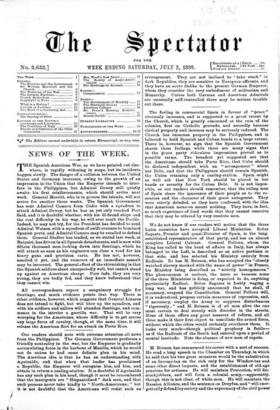We do not know if our readers will notice that
the three Latin countries have accepted Liberal Ministries. Senor Sagasta, Premier and quasi-Dictator of Spain, is the long- established representative of that party, and has an almost complete Liberal Cabinet. General Pelloux, whom the Sing has called to the head of affairs in Italy, has always belonged to the Left, is described as an active partisan oi that side, and has selected his Ministry entirely from Radicals. So has M. Brisson, who has accepted the "closely watched slavery mocked with the name of power" in France, his Ministry being described as "strictly homogeneous." The phenomenon is curious, the more so because none of the three Ministries is doing, or expected to do, anything particularly Radical. Senor Sagasta is feebly waging a long war, and has publicly announced that he shall, if necessary, suspend the Constitution. General Pelloux will, it is understood, propose certain measures of repression, and, if necessary, employ the Army to suppress disturbances " rigorously ; " and M. Brisson is of all men alive the one most certain to deal sternly with disorder in the streets. None of them offers any great measure of reform, and all three make it their first object to conciliate the armed force, without which the cities would certainly overthrow them. It looks very much—though political prophecy is futile— as if the Radicals of the South had entered upon a period of mental lassitude. Note the absence of new men of repute.


































